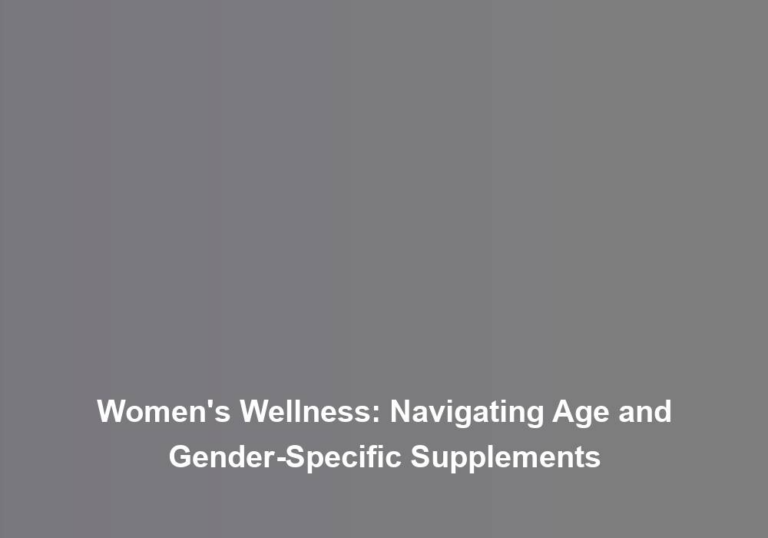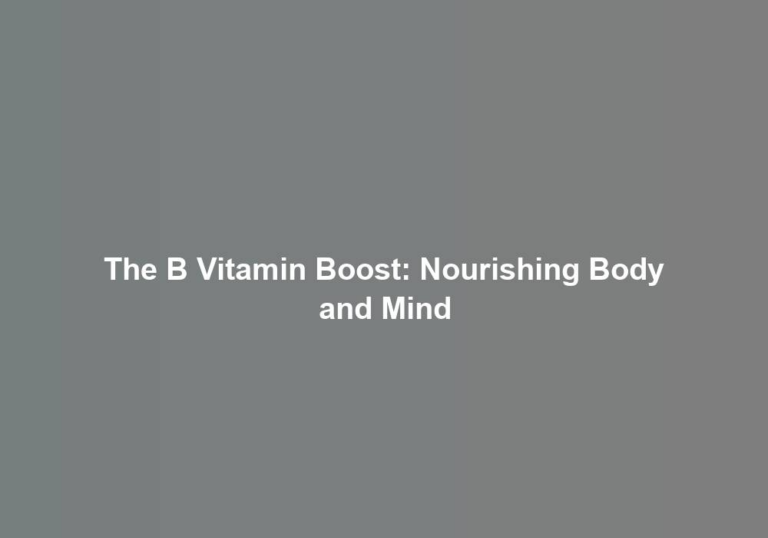Navigating Supplementation: Guidelines for Vitamins and Minerals
Navigating the world of supplementation can feel like trying to find your way through a dense forest without a map. With so many options and conflicting information, itG??s easy to get lost in the thicket of vitamins and minerals. But fear not, because there are clear guidelines and strategies to help you confidently navigate this maze. As you embark on this journey to optimize your nutrition, youG??ll discover essential insights on understanding your bodyG??s needs, selecting high-quality supplements, and maximizing their effectiveness. So, buckle up and get ready to unlock the secrets of supplementation that will empower you to take control of your health and well-being.
Understanding Essential Nutrients
Understanding essential nutrients is crucial for maintaining optimal health and vitality. Nutrients are substances that the body needs to function properly. They are essential for growth, energy production, and overall well-being. Without proper nutrient absorption, the body may suffer from various deficiencies that can lead to health problems. Nutrient deficiency occurs when the body does not receive an adequate amount of a particular nutrient, leading to impaired bodily functions and potential health issues.
Nutrient absorption is the process by which the body breaks down food and uses its components for growth, energy, and repair. It is a complex process involving various organs such as the stomach, small intestine, and liver. For example, vitamin B12 is absorbed in the small intestine, and iron absorption occurs in the duodenum. Understanding how these processes work can help you make informed decisions about your diet and potential supplementation.
Nutrient deficiency can lead to a range of health issues, such as anemia, weak immune system, and impaired cognitive function. Common deficiencies include iron, vitamin D, and vitamin B12. It is important to consume a balanced diet that includes a variety of nutrient-rich foods. However, in some cases, supplementation may be necessary to address specific deficiencies.
Assessing Your Nutritional Needs
To determine your specific nutritional needs, it is essential to assess your dietary habits and consider potential factors that may impact your bodyG??s requirements for vitamins and minerals. Start by evaluating deficiencies that may be present in your diet. This can be done by keeping a food diary for a week to track your daily intake of various nutrients. Look at your consumption of fruits, vegetables, whole grains, lean proteins, and dairy products. Understanding your typical dietary patterns will help identify areas where you may be lacking essential vitamins and minerals.
In addition to evaluating your diet, itG??s important to consider individual factors that can influence your nutritional needs. These factors include age, gender, lifestyle, and any existing health conditions. For instance, pregnant or breastfeeding individuals have increased requirements for certain nutrients, while older adults may need more vitamin D and calcium for bone health. Furthermore, individuals with digestive disorders or those following restrictive diets may have difficulty absorbing certain nutrients, necessitating personalized recommendations.
Seeking guidance from a healthcare professional or a registered dietitian can provide valuable insights into your specific nutritional needs. These experts can offer personalized recommendations based on your dietary assessment, lifestyle, and individual requirements. By taking a proactive approach to assessing your nutritional needs, you can make informed decisions about incorporating appropriate vitamin and mineral supplements into your daily regimen and optimizing your overall health and well-being.
Selecting Quality Supplements
Assessing your nutritional needs is the first step in determining which quality supplements are best suited for your individual requirements and overall well-being. When selecting quality supplements, itG??s crucial to consider various factors to ensure that you are choosing the best options for your health. Here are three key aspects to keep in mind:
-
Quality Control: Look for supplements that have undergone rigorous quality control measures. This includes certifications from reputable third-party organizations, such as the United States Pharmacopeia (USP), NSF International, or ConsumerLab.com. These certifications ensure that the supplements meet specific standards for quality, purity, and potency.
-
Ingredient Sourcing: Pay attention to where the ingredients in the supplements are sourced from. High-quality supplements use ingredients that are sourced responsibly and sustainably. For instance, if you are looking for fish oil supplements, consider products that use wild-caught fish from clean waters to minimize the risk of exposure to contaminants.
-
Transparency: Choose supplements from companies that prioritize transparency in their manufacturing processes. Look for brands that provide detailed information about the sourcing, manufacturing, and testing of their products. This transparency can give you confidence in the quality and integrity of the supplements you are considering.
Dos and DonG??ts of Supplementation
When considering vitamin and mineral supplementation, itG??s essential to make informed choices based on your specific nutritional needs and health goals. Here are some dos and donG??ts to help you navigate through the supplementation process.
Dos and DonG??ts of Supplementation
| Dos | DonG??ts |
|---|---|
| 1. Consult a healthcare professional | 1. Exceed recommended dosage |
| ItG??s crucial to seek advice from a healthcare professional before starting any new supplement regimen. They can help assess your individual needs and potential interactions with any medications you may be taking. | Taking more than the recommended dosage can lead to adverse effects and toxicity. Stick to the suggested amount unless otherwise advised by a healthcare provider. |
| 2. Research potential interactions | 2. Assume all supplements are safe |
| Some supplements can interact with medications or other supplements, affecting their effectiveness or causing harmful side effects. Research potential interactions and discuss them with your healthcare provider. | Not all supplements are safe for everyone. Certain supplements may have adverse effects or interact with existing health conditions. Always seek professional guidance before adding new supplements to your routine. |
| 3. Monitor for side effects | 3. Disregard dietary sources |
| Keep track of any changes you experience after starting a new supplement. If you notice any adverse effects, discontinue use and consult your healthcare provider. | While supplementation can help fill nutritional gaps, itG??s important to prioritize a balanced diet with nutrient-dense foods. Relying solely on supplements may lead to nutrient imbalances and deficiencies. |
| 4. Follow recommended dosage | 4. Use supplements as a substitute |
| Adhering to the recommended dosage is crucial for safety and effectiveness. More does not necessarily mean better when it comes to supplements. | Supplements should complement a healthy diet, not replace it. They are meant to provide additional support, not serve as a substitute for nutritious foods. |
| 5. Store supplements properly | 5. Neglect expiration dates |
| Proper storage, such as keeping supplements in a cool, dry place and away from direct sunlight, helps maintain their potency and safety. | Expired supplements may not only be less effective but could also pose health risks. Always check expiration dates and discard any expired supplements. |
Adhering to these dos and donG??ts can help you make informed choices and maximize the benefits of supplementation while minimizing potential risks.
Maximizing Absorption and Effectiveness
Maximizing the absorption and effectiveness of vitamins and minerals requires careful consideration of factors influencing their bioavailability. To improve bioavailability and enhance utilization, here are three practical strategies to optimize nutrient uptake and increase efficacy:
-
Pairing with Fat: Consuming fat alongside fat-soluble vitamins such as A, D, E, and K can significantly improve absorption. Incorporating healthy fats like olive oil, avocados, or nuts into your meals can enhance the bodyG??s ability to absorb these essential vitamins.
-
Timing and Interaction: Pay attention to the timing of your supplement intake. Some minerals and vitamins can compete for absorption when taken together. For example, calcium can hinder the absorption of iron, so itG??s advisable to take them at different times to maximize their individual uptake.
-
Quality and Form: Opt for high-quality supplements in a form that ensures better absorption. For instance, chelated minerals are often more bioavailable than non-chelated forms. Additionally, choosing supplements from reputable brands that undergo rigorous testing can enhance the effectiveness of the nutrients you are consuming.
Monitoring and Adjusting Your Regimen
To ensure the effectiveness of your supplement regimen, it is crucial to regularly monitor your vitamin and mineral levels through blood tests. Your healthcare professional can help interpret these results and make necessary adjustments to your supplement routine. By staying proactive and seeking professional guidance, you can optimize the benefits of your supplementation.
Regular Blood Tests
Regular blood tests are essential for monitoring and adjusting your regimen of vitamins and minerals. These tests provide crucial information to ensure that your supplementation plan is effective and safe. Here are three key aspects to consider:
-
Frequency: Regular blood tests should be conducted as recommended by your healthcare provider, typically at least once a year or more frequently if necessary. This will help track any changes in your nutrient levels over time.
-
Accuracy: ItG??s important to ensure that the blood tests are conducted by a reputable laboratory and that the results are accurate. Discuss the specific tests and their accuracy with your healthcare provider to guarantee reliable results.
-
Importance of Interpretation: Once the results are available, itG??s essential to interpret them correctly. Your healthcare provider can help you understand the implications and make any necessary adjustments to your supplementation regimen based on the findings.
Consulting Healthcare Professional
After ensuring the accuracy and interpretation of your regular blood test results, the next step is to consult your healthcare professional for monitoring and adjusting your regimen of vitamins and minerals. Seeking advice from a healthcare professional is essential for personalized guidance. Your healthcare provider can offer professional guidance based on your specific health status, potential interactions with medications, and individual nutritional needs. They can also help you understand how certain vitamins and minerals may affect your body and provide recommendations on adjusting your supplement regimen accordingly. By consulting with a healthcare professional, you can ensure that your supplementation aligns with your overall health goals and is tailored to meet your unique needs. Regular follow-ups with your healthcare provider will also allow for ongoing monitoring and adjustments as necessary.
Conclusion
In the vast sea of supplementation, navigating the right vitamins and minerals for your needs can feel like charting a course through uncharted waters. But armed with the knowledge of essential nutrients, your individual nutritional needs, and the dos and donG??ts of supplementation, you can steer towards the right supplements. Keep an eye on the horizon, monitor and adjust your regimen as needed, and youG??ll sail towards optimal health and wellness. Smooth sailing awaits!







